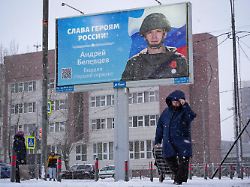London sees dilemma for Moscow
Is the Kremlin raising the age limit for conscripts?
01/15/2023 11:31 am
Russia the soldiers are dying away. But a new “partial mobilization” could again provoke greater resentment in the population. The British secret service therefore suspects that the Kremlin, as a lesser evil, could increase the maximum age of men eligible for screening.
The Kremlin could Assessment of the British Secret Service raise the age limit for conscription. This is reported by the Ministry of Defense in London.
Accordingly, on Jan. 12, the chairman of the Russian State Duma’s defense committee, Andrei Kartapolov, proposed raising the age limit for routine military conscription from 27 to 30 in time for conscription in the spring of 2023. According to Kartapolov, this step should enable the previously announced increase in the Russian armed forces by 30 percent. Last year, President Putin backed such a move, and Russian officials are likely to gauge public reactions.
“There is a reasonable possibility that the Russian leadership is hoping that changing the age criteria for routine conscription could increase the available staff and appear less alarming to the population than a new round of an unpopular ‘partial mobilization process,'” the statement said message further.
In Russia, all men between the ages of 18 and 27 are generally conscripted. In view of the massive difficulties facing the Russian army in Ukraine, Russian President Vladimir Putin ordered a so-called partial mobilization of 300,000 reservists in September last year. Recently, however, there has been repeated speculation as to whether there will be a new wave of mobilization.
Ukraine: Russia closes borders for those fit for military service
Ukraine’s secret service said last week that since January 9, Russian citizens who are fit or not fit for military service have not been allowed to leave the Russian Federation. Putin’s press secretary, Dmitry Peskov, denied the reports, calling them “an ordinary information duck,” according to the Russian news agency TASS wrote.
